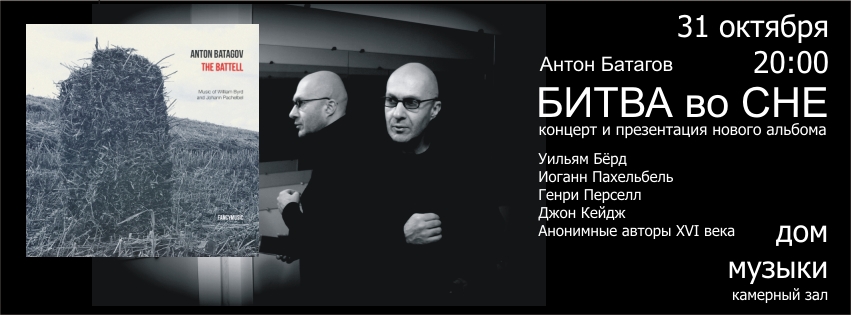|
Anton Batagov
BATTLE IN A DREAM
a solo piano recital at the Moscow International House of Music
September 31, 2014
________________
Anonymous (Early XVI century): A Galyarde
William Byrd: Will yow walke the woods soe wylde
Henry Purcell: Ground in C minor
- - - - - - - - - - - - - - - - - - - - - - - -
Henry Purcell: Suite in G major
Johann Pachelbel: Chaconne in F minor
Anonymous (Early XVI century): My Lady Careys Dompe
Henry Purcell: Chaconne in G minor
Johann Pachelbel: Canon in D major
- - - - - - -
Encore: Henry Purcell: Rondo in D minor
_______________________________
I was about to begin this text with something like this: "True minimalists lived in the 16 th – 17 th centuries." And then I thought you might say: "Hmm, there he goes again talking about that minimalism." And it’s true: the word is so unfit. Human language is very limited, and every time we attempt to express something important we discover that our language simply doesn't work. How can we explain what this music sounds like? How can we explain that it is more contemporary than contemporary music? How can we explain that in the sounds written 300 – 500 years ago one can hear the whole volume of all European music of several centuries, as well as everything we now call ethnic music, from bagpipes and Celtic fiddles to Indian sitars? A refined scent of jazz, and a punk band playing in a club around the corner. A dramatism stronger than Beethoven's, and the larger-than-life boundless space of a rock ballad. As for the compositional technique, it is pretty simple. Composers of that time used to write the same things over and over again: exercises of sorts, endless variations on a chord sequence. Not only does this never get boring, but the longer you listen, the less you want it to stop. Each variation opens a door in front of you, and you walk through this endless enfilade and realize that it is none other but a way home. And this, you could say, is minimalism. All compositions included in this programme were written certainly not for piano. The works of William Byrd, Henry Purcell and anonymous composers are for the virginal (a British modification of the harpsichord). The works of Johann Pachelbel are for organ (Chaconne), and for strings (Canon). I play them on a modern piano, and I treat the scores with a lot of freedom. I don't change even a single note but for some reason it sounds as if it was written this morning. Two pieces by John Cage are the only exception. They were written in the mid 20th century for piano or harp. Their presence in this programme helps us forget that music can be old or new. |
